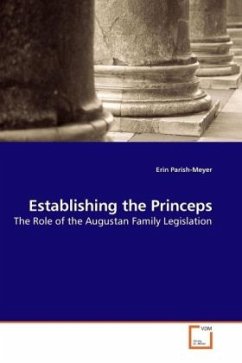This work challenges the widely accepted belief among scholars that the first princeps Augustus enacted the lex Iulia de adulteriis coercendis, lex Iulia de maritandis ordinibus, and lex Papia Poppaea as part of an effort to increase a declining Roman elite citizen population. It examines the motives behind Augustus family legislation, specifically considering connections between the laws and the Roman value pietas, contemporary literature, particularly rhetorical invective and elegiac poetry, Augustan public art, and the beliefs Roman men apparently held regarding contraception and abortion. Additionally, this study examines the laws in question, their potential effects on Roman society and how these might have served Augustus purposes, as well as the generally negative reactions among the elite and the princeps responses to their rejection of the laws. The conclusion is that Augustus motive was to strengthen the position of the princeps so that he would be better situated to pass it on to a successor of his choosing.
Bitte wählen Sie Ihr Anliegen aus.
Rechnungen
Retourenschein anfordern
Bestellstatus
Storno








